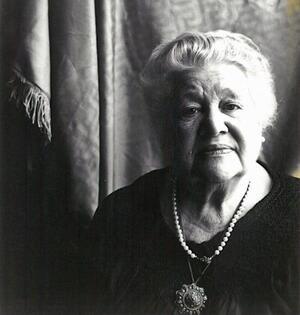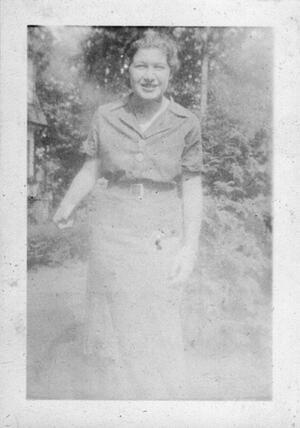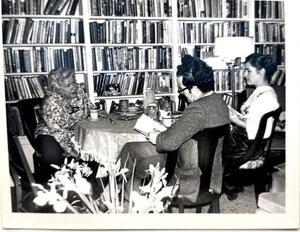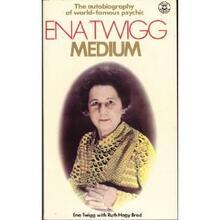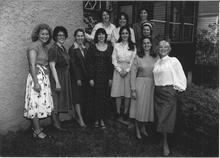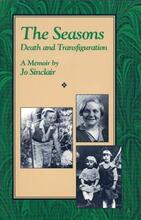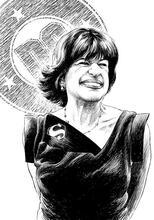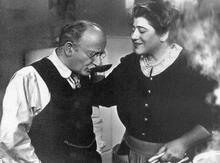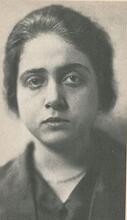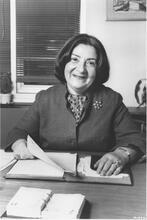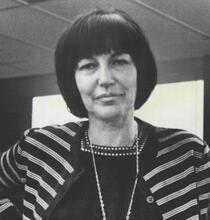Bertha Klausner
Bertha Klausner was one of the most influential literary agents of the twentieth century. In a career spanning six decades, she represented major writers and cultural figures, including Upton Sinclair, Marcel Marceau, Robert Payne, Anthony Burgess, and Dorothy West. In 1945, after developing a national newspaper syndicate, Klausner founded her literary agency in New York. She later expanded to the other coast, traveling between Manhattan and Hollywood, where she sold radio, television, and film scripts. A cultural force—and one of the earliest female literary agents—Klausner hosted business luncheons and cocktail parties attended by the leading writers, editors, and producers of her day. She continued to sell manuscripts until a few months before her death in 1997, at the age of 96.
Early Years and Family
Born in Brooklyn on March 27, 1901, Bertha Klausner was the daughter of Jewish immigrants from the Austro-Hungarian empire. Her father, Jacob Adler, was a renowned Yiddish writer who wrote poems, plays, and short stories under multiple pen names, including B. Kovner. He was best known for the humor columns “Moishe Kapoir” and “Yente Telebende,” which appeared in the Jewish Daily Forward. Klausner’s mother, Celia Adler, was a homemaker devoted to her husband’s literary career.
Prior to Jacob Adler’s success, he struggled for 20 years. Bertha, the oldest of his five children, watched him pursue his career as a writer despite the financial sacrifices it entailed. While Bertha’s childhood was marked by poverty, it was equally rich in culture. Her father took her to political and literary events, imbuing her with a love for the arts and social activism. When he finally succeeded as a writer, becoming famous in the Yiddish world, Bertha took great pride in his accomplishments.
In 1921, Bertha Adler married Edward Klausner, a structural engineer. They settled in Asbury Park, New Jersey, and had two children, Samuel and Debora. Bertha quickly rose to become a leader in her local community, serving as president of the Young Women’s Hebrew Association of Asbury Park.
Entrepreneurial Spirit
Following the stock market crash of 1929, Edward’s engineering work dried up. At a time when few women worked outside the home, Bertha stepped in to support her young family. With her family’s last $2,000, she founded a Women’s Exchange. First established in the 1830s, Women’s Exchanges enabled widows to sell their handicrafts and earn much-needed income; in the twentieth century, the model was expanded to include all women. After researching contemporary exchanges, Klausner selected more than 300 handicrafts made by local women and successfully launched the Asbury Park Women’s Exchange.
In the same entrepreneurial spirit, Klausner struck a deal with local banks. In exchange for their upkeep and care, Klausner and her family occupied mansions that had been left empty and abandoned following the stock market crash. In the spare rooms, she housed new immigrants who, in lieu of paying rent, provided cooking, cleaning, and childcare for the Klausner family. In this way, Klausner got her family through the Depression years. Capitalizing on her entrepreneurial and deal-making skills, she made sure her family was well-housed and fed at a time when resources were scarce.
Publishing Career Beginnings
Klausner’s career in publishing began with forays into the newspaper business. In the 1930s, she partnered with local journalist Harold E. Krasner to establish The Monmouth Independent, which helped dismantle Asbury Park’s corrupt city government. With editorials written by her husband and detailed reporting on bribery and embezzlement by local officials, The Monmouth Independent helped to topple the city’s corrupt mayor and install a new city manager.
Klausner’s publishing endeavors did not stop there. In partnership with Krasner, she created a national newspaper syndicate, the Independent Publishers Syndicate, which ran in multiple newspapers across the United States. At its peak, Klausner’s syndicate—an illustrated features supplement—appeared in more than 500 American newspapers.
In 1938, Klausner left the Independent Publishers Syndicate in Krasner’s hands and began representing the illustrators and cartoonists whose work appeared in its pages. She also represented painters, including Anna Neagoé, a Polish-born Jewish artist whose work was widely exhibited in New York and Paris.
Seven years later, in 1945, Klausner pivoted to primarily representing writers and founded the Bertha Klausner International Literary Agency. By that time, she had raised her two children and relocated to an apartment on E. 40th St. in Manhattan. From her living room, she began selling manuscripts, radio plays, and dramas to major networks, studios, and publishers. A gifted networker who rarely took no for answer, Klausner was a natural fit.
Expansion to Hollywood
Several years after the establishment of her literary agency in New York, Klausner turned her sights to Hollywood. At the urging of Don Carl Gillette, the longtime editor of the Hollywood Reporter, she opened a satellite office in Los Angeles. Klausner quickly made a host of contacts and friends on the West Coast, including Stanley Kramer, the legendary producer of such films as Inherit the Wind and Judgment at Nuremberg.
In 1955, Klausner wrote to her secretary in New York, “I am convinced that I should be here every other month. I can sell fast—as I make friends & they are anxious to cooperate” (Bertha Klausner Papers, 1955). Working out of the Hollywood Hawaiian Apartments, across from NBC, Klausner feted her clients at luncheons and cocktail parties attended by the leading media and entertainment figures of Los Angeles.
At a time when few women worked on the business side of entertainment, Klausner established herself as a key player in the Hollywood ecosystem. Her sales were reported almost daily in The Hollywood Reporter and reprinted in Variety. Her notable film sales included Birdman of Alcatraz, based on the 1955 book by her client Thomas Gaddis, and Zorba the Greek, the Oscar-winning film based on the novel by her client Nikos Kazantzakis. She also sold 20-minute radio scripts to stars Eddie Cantor, Kate Smith, and Rudy Vallee; an early CBS game show; and the first full-hour drama to NBC and U.S. Steel.
Klausner also represented actors who were writing memoirs and film scripts. Her list of thespian clients included Basil Rathbone, Lionel Barrymore, Theda Bara, and Joe E. Brown. While Klausner found success in Hollywood, the ten percent commissions she earned were insufficient to keep her office afloat. In 1960, she closed her West Coast office and returned to working full-time from New York.
Notable Clients and Projects
Throughout her career, Klausner represented a wide range of authors, from novelists to historians to politicians—and even mimes. One of her best-known clients was Marcel Marceau, the French mime who charmed audiences as the character known as “Bip.” Klausner helped introduce Marceau to American audiences and negotiated the sale of his books, The Story of Bip and Pimporello.
Another of Klausner’s prominent clients was Upton Sinclair. Known for The Jungle, a novelistic exposé of the American meat-packing industry, Sinclair was a muck-raking journalist and fiction writer whom Klausner represented from 1950 until his death in 1969. In Sinclair’s 1962 autobiography, he wrote, “One of the most unusual occasions was a luncheon given by my faithful agent, Bertha Klausner, who invited only those people who are working, in one way or another, with my various books—publishing or reissuing or dramatizing them for stage or screen. And, there was a roomful of them!” (Sinclair, 1962, 325).
As Sinclair recalled, Klausner often hosted business luncheons from her midtown apartment. Waking up early to cook for these luncheons herself, Klausner worked non-stop. Known for her warmth, loyalty, and work ethic, she forged relationships and made deals over home-cooked soufflés. In 1969, she moved to an apartment at 71 Park Avenue, which, like its predecessor, became a literary hub for writers, editors, and producers. In a nod to her formidable presence, Sinclair gave her the nickname “The Big Bertha of Literary Agents.”
Klausner’s notable clients included Anthony Burgess, the author of A Clockwork Orange; Harlem congressman Adam Clayton Powell, Jr.; Yiddish writer Israel Joshua Singer; and Harlem Renaissance writer Dorothy West. Klausner also represented Hoyt Fuller, an influential editor and proponent of Black arts and culture; Emil Lengyel, a popular historian who wrote about the Second World War; Leon Jaworski, who prosecuted Nazi war criminals in the Nuremberg Trials and served as Special Prosecutor in the Watergate affair; and Leah Napolin, who wrote the stage play Yentl, based on the short story by Isaac Bashevis Singer.
Klausner’s most prolific client was Robert Payne, the eminent historian, biographer, and novelist, who wrote The Life and Death of Adolf Hitler. Over the course of many years, Klausner sold more than 100 of Payne’s books. She also helped introduce the Greek writer Nikos Kazantzakis to the American market, selling six of his books to Simon and Schuster.
Later Years
Klausner continued working into her mid-90s, reading manuscripts and advocating for her clients. In addition to being a groundbreaking literary agent and grande dame of New York City, she was also a devoted mother, grandmother, and great-grandmother.
On December 29, 1997, at the age of 96, Klausner died of natural causes.
Bertha Klausner Papers. 9562. American Heritage Center. University of Wyoming.
Dickinson, Ellen E. “New York Exchange for Women’s Work.” The Art Amateur 1, no. 2 (1879); republished in Women & the American Story, New York Historical Society. https://wams.nyhistory.org/a-nation-divided/reconstruction/ny-exchange-for-womens-work/.
“Jacob Adler, Yiddish Humorist And Prolific Writer, Dies at 101.” New York Times, January 1, 1975.
Kaufman, David E. “Young Women’s Hebrew Association.” The Shalvi/Hyman Encyclopedia of Jewish Women, March 20, 2009. Jewish Women’s Archive. (Viewed on January 12, 2025.) https://jwa.org/encyclopedia/article/young-womens-hebrew-association.
Sinclair, Upton. The Autobiography of Upton Sinclair. New York: Harcourt, Brace & World, 1962.
Weizmann, Jane. “Federation of Woman’s Exchanges,” December 1, 2022. https://wefed.blogspot.com/2008/09/federation-of-womens-exchanges-home.html.

